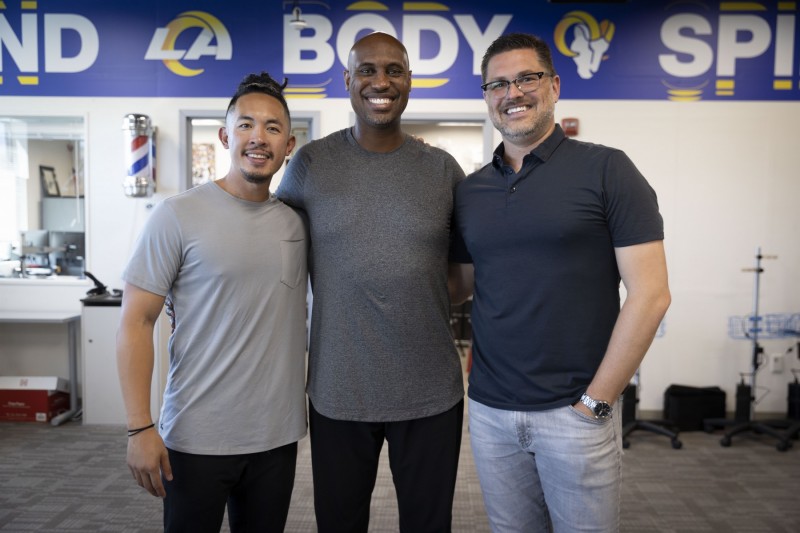RAM-ping up for Another Championship Season
Q&A With Cedars-Sinai Kerlan-Jobe Institute Sports Medicine Specialists—Including an LA Rams Team Physician—and Rams Head Trainer Ahead of the NFL Season
While the Los Angeles Rams quarterback Matthew Stafford works on his timing in the pocket, sports medicine specialists from Cedars-Sinai Kerlan-Jobe Institute—renowned for treating today's top professional athletes—are going through their reps to keep players healthy as they prepare to defend their championship title. Cedars-Sinai Kerlan-Jobe Institute specialists serve as the official team physicians for the Rams.
"A lot of what people see is the finished product on the field on Sundays," said Casey Batten, MD, Rams primary care physician and Cedars-Sinai Kerlan-Jobe sports medicine specialist. "What you don't see are the countless hours and sacrifice it takes from everybody, not just the medical staff but everybody involved with the organization, to get to that point–it really is grueling.”
 Batten recently joined Jon Hernandez, a physical therapist at Cedars-Sinai Kerlan-Jobe Institute, and Reggie Scott, Rams head athletic trainer and vice president of sports medicine and performance, to share their insights with the Cedars-Sinai Newsroom about keeping players healthy and safe on and off the field ahead of the season kickoff on Sept. 8.
Batten recently joined Jon Hernandez, a physical therapist at Cedars-Sinai Kerlan-Jobe Institute, and Reggie Scott, Rams head athletic trainer and vice president of sports medicine and performance, to share their insights with the Cedars-Sinai Newsroom about keeping players healthy and safe on and off the field ahead of the season kickoff on Sept. 8.
Newsroom: What are each of your roles during preseason?
Batten: Preseason differs from the regular season and is far more intensive. For the medical staff, we are present pretty much 24/7, should anything happen during practice.
A lot of the medical activities involved in taking care of a football team aren’t necessarily isolated to the field. There's a lot of behind-the-scenes care–like evaluating players, rehabbing them, and providing treatments during practice and when we travel.
Hernandez: Preseason is the busiest time of year for us, and we train seven days a week over an eight-week period. With everything from athletic training, nutrition, player development, sports psychology, physical therapy, we all work as one unit, as a performance team.
There is some gray area between disciplines, but at the end of the day, we all work together because we lean on each other's expertise. There's a synergistic relationship where we feed off each other and learn from each other.
Scott: We all know this game causes a lot of injuries and it is a lot of wear and tear on the body. Athletic trainers are like physical therapists for athletes, but we are also trained to do acute care on the field.
When a player is injured, we're looking at the mechanism of the injury–how did the injury happen?–that gives us a lot of information. When we run out to the field, we already have a substantial amount of information just by watching and evaluating how the injury happened.
At the end of the day, we create and provide the best safe environment for athletes to play at a high level, which is really important for us to be able to win games.
Newsroom: What are the most common injuries you see during preseason?
Batten: There really isn’t full contact during NFL practice anymore, and you'll see that pretty much at all levels throughout football, down to college and high school. They're not doing a lot of full contact or tackling outside of the games, especially at the NFL level.
Most players come in from the off-season in excellent shape; they are professional athletes who train year-round. However, injuries still happen. If you look at the statistics and the data, the thing that you see most through training camp as they ramp up their activity is soft tissue injuries. That can include hamstring strains, groin strains and muscular strains.
Newsroom: When an injury does occur, how is a player’s return to the field decided?
Batten: What's great about the Rams is it's very collaborative. We work with the athletic training staff, coaching staff, strength and conditioning staff, our nutrition staff, and mental health staff, and take in all their input when getting a player back on the field.
In terms of the medical decision-making and who receives a questionable, doubtful, or even injured reserve status, that's really a decision we make as a medical team in conjunction with Reggie Scott and his team.
Scott: I don't think people have any idea of how much work goes into making the decisions that our medical team has to make day in and day out to create a good environment for these guys. Through treatments, diagnosis, evaluations and surgical outcomes, they really do have an elite care team, a team we're so fortunate to have.
Newsroom: Going into the season as defending champions, do you feel like the pressure is on?
Hernandez: Regardless of what it is, we're always ready for anything and that's a testament to the preparation that everyone puts in year-round.
Scott: At the Rams and across the league, but especially here, they are always expecting championship-level performance from everybody involved with the organization. We're always trying to win championships, but the expectations are the same every year and they're very high.
Read more on the Cedars-Sinai Blog: Cedars-Sinai Kerlan-Jobe Institute Provides World-Class Joint Care for All Athletes and Active Lifestyles



